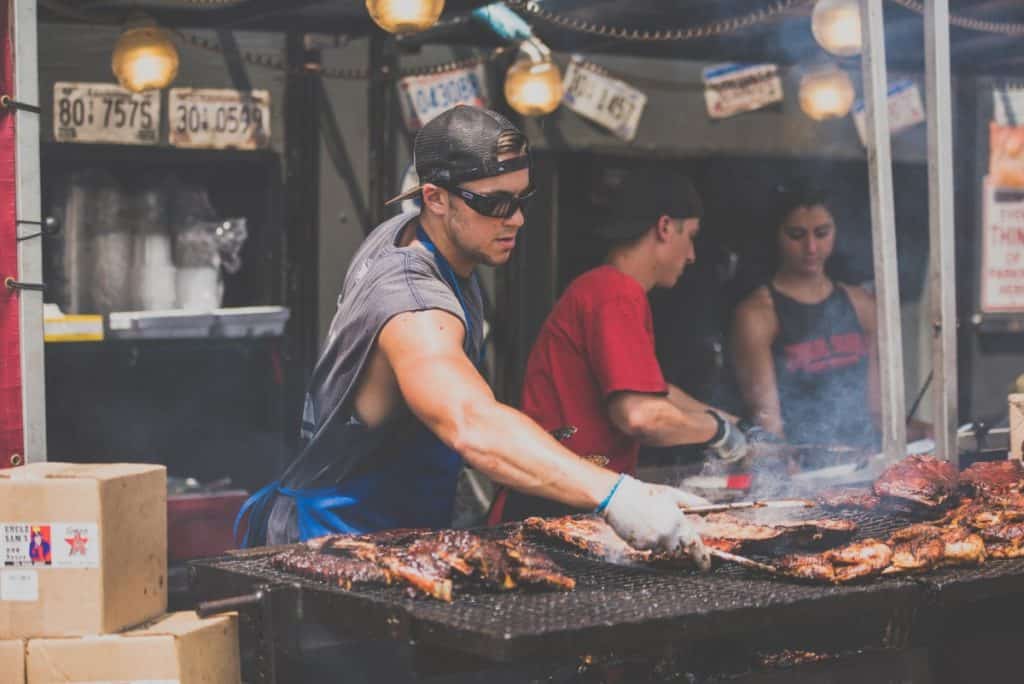You’ve been planning that beach BBQ all week. The food is prepped, seasoned, and ready; but the weather is not. When inclement weather sets in, you normally reach for your trusty beach canopy. So can you grill under a canopy tent to get out of the rain?
While tempting, this introduces a very real fire danger. If something goes wrong, you could put yourself or others at significant risk! I would never recommend anyone use an open grill with an exposed flame under a canopy. There will be some cooking setups that will be less risky, and there are some common sense things you can do to reduce the chance of fire danger.
What are the risks?
Any structure placed over a fire/heat source is a potential fire hazard. Just as you would think twice about cooking under a tree or low branches, you should also consider the risks involved with cooking under a canopy tent.
Most pop-up canopies covers are made of either polyester or polyethylene, which will melt and potentially ignite if they heat up too much. Therefore there is a potential for people to get burnt by drops of melting canopy overhead, and for these drops to start their own fires if they hit flammable sources. If the canopy material ignites it could start a larger fire, and people could receive severe burns.
How can you grill under a canopy tent safely?
Fire Safety
If you choose to go ahead and take a chance on cooking under a canopy, you should first check your product manual for manufacturers recommendations around fire safety.
Here are some ideas to reduce the fire risk:
- The best control is always to eliminate or substitute the hazard. Consider other options like using a publicly available BBQ with purpose built coverings if available, or changing your menu to not need to cook onsite.
- Try pre-cooking your food in a kitchen beforehand to reduce cooking time required
- Ensure adequate space above the heated surface. Depending on your grill type, I would allow at least six feet of space above it to allow the heat to dissipate.
- Using a canopy that has been rated for fire resistance (e.g. CPAI 84 and NFPA 701) will reduce the chance that a spot fire will spread to the whole canopy. It won’t provide total fire protection, or reduce the need for adequate height above the heat source.
- If there is little to no wind around, you need to be especially careful that you don’t concentrate too much heat overhead. Depending on your setup you may wish to use a small portable fan to move the heat away.
- Think about the placement of the grill under the canopy. Move it as close to the side of the canopy as possible, and ideally so that the wind takes the smoke/heat away from the structure.
- Have appropriate fire fighting equipment available to put out small spot fires. Only do this if you are trained and comfortable that you can manage the small fire. If it’s not responding to your efforts, call emergency fire services.
- Consider that if you are using the canopy in the rain, some canopy structures will begin pooling water in the roof. The last thing you want is your grill to get dumped on by a deluge of water
- Make sure your canopy is secured so it won’t fly off and knock/compromise the cooking equipment
Equipment safety
Besides the obvious damage from excessive heat, you should also consider that any smoke emanating upwards, or oil spitting from the grill, can stain the canopy fabric. Consider that even if you have fire-resistant rated material, you will almost definitely void your warranty if you damage your canopy whilst cooking underneath.
Effect on cooking
Cooking in the rain often also means cooking in windy conditions. This can cause your cooking temperature to vary significantly, so you might need to consider shielding the flame.
Conclusion
Carefully weigh up the risks when cooking underneath any structure, especially a pop-up canopy tent. If you don’t put in place the right controls, there is a possibility that you will damage/spoil your canopy, and potentially set it on fire! For more grill safety information check out this one-pager from the National Fire Protection Association.

